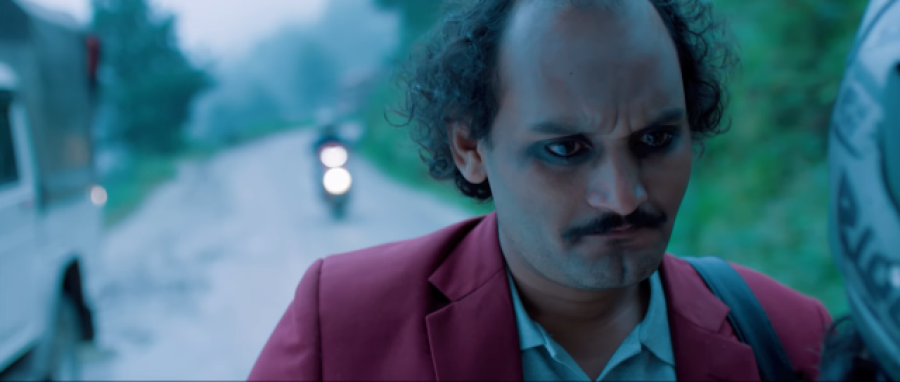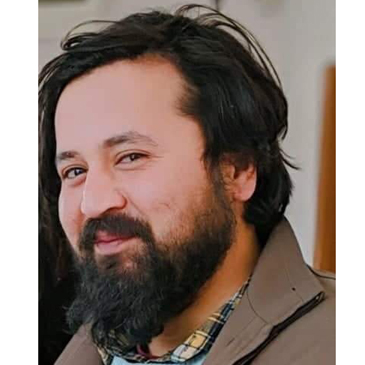Culture & Lifestyle
The tiresome, selfish Selfie King
For a debut film, Bishal Sapkota has shown potential and audacity. The film is far from perfect, but it does have a few moments of brilliance.
Abhimanyu Dixit
There’s this sequence towards the end of the song ‘Jindagiko ke cha ra bhara’ in the film Selfie King, where the titular character is on a motorcycle with a milkman. The motorcycle flies off the highway, crashes into a bush and the song comes to a sudden halt. The shot doesn’t cut and the camera remains static, and if it weren’t for the moving blades of grass, you’d assume the cinema hall projection is stuck. But, after a while, Selfie King rises from the accident and continues with his journey. All of this happens in a single shot, and the outcome is something I’m sure the filmmakers, stunt team, and actors are all proud of. But for the Nepali cinema audience that is mostly accustomed to fast-paced entertainment, this scene, and the film as a whole, can feel like a test of patience.
Gopal (Bipin Karki) is Selfie King, the lead character of a TV comedy show by the same name. The character and his show bear resemblance to the Nepali comedy TV characters we’ve grown up watching. Similar to Nepali TV comics, Selfie King even talks in catchphrases with exaggerated comic sound effects.
Gopal’s mother (Bhuwan Chand) loves Selfie King. She watches his reruns and echoes his catchphrases. But Gopal’s father (Lokmani Sapkota) doesn’t approve of his son’s career choice, rather wishing he was more responsible; his primary grievance is Gopal’s lack of interest in household chores.
One day, while watching his son’s performance on TV, Gopal’s father laughs hysterically and suffers from a severe stroke, ending up in the hospital. Gopal rushes there to find that his father requires surgery. But Gopal has to leave Kathmandu for work, having agreed to perform in faraway Salleri in Solukhumbu district, and since the surgery is scheduled a few days later, Gopal decides to go. His wife (Laxmi Bardewa) and sister (Gita Adhikari) don’t approve but Gopal defends his decision saying that he is an artist and this is his job.
Just as he is set to leave, the organiser of the event, Hari, (Jiban Bhattarai) informs Gopal that he has to travel by road. So, Gopal is quite hesitant, not because he’s thinking about his father, but because he would have to change two vehicles to get to Salleri, and because he vainly thinks that he is too recognisable as a celebrity to travel on a public vehicle.
Suffice it to say, Gopal is entitled. He feels like he deserves to be treated better—like celebrities should be. But the world around him does not really care. On the way to Salleri, he meets people on the bus who belittle him for his profession. They ask him overtly personal questions, and expect him to smile when taking a picture with them. Not even fans of Selfie King seem to care about him.
We see this world subjectively, through Gopal’s perspective. But Gopal is written as a person and not a hero. He is not designed to be likeable. He is easily irritated and constantly angry at the world around him. He scolds his wife for no apparent reason and is unwilling to interact with people who recognise him.
Bishal Sapkota is the writer and director of this film. And as a writer, Sapkota is not afraid to torture and humiliate his lead. In one particular scene, after a night of heavy drinking, Gopal wakes up, having wet his hotel room bed. It’s obvious that the script has nuanced subtexts, slow reveals, and very interesting moments, but in the film, all of the brilliance—sadly—is sandwiched between repetition and tedium.
Sapkota’s lead character is always complaining and whining. While travelling, he complains because he does not get a seat in the front; he whines and pleads to a fellow passenger to give up his window seat. On reaching the hotel, he complains to the staff for not charging his phone. He is also a loud alcoholic. When he is drunk, he complains louder. He complains to his organiser for not flying him to the event, and whines about his face being too small on the event poster. He even reprimands a junior caricature artist Dipak BK (Abhaya Raj Baral) for not respecting Gopal like he used to. The complaints take up so much time that it becomes very difficult for audiences to feel anything more than irritation for the lead.
Sushan Prajapati’s cinematography uplifts Sapkota’s nuances. Sapkota uses mirrors and glass quite effectively as a motif multiple times in the film—Gopal’s first scene is in front of a mirror. Many times, Gopal looks into a mirror or through a glass for encouragement, when he is conflicted about his father, considering his dilemmas, or when he is most vulnerable. In one scene, Gopal dreams of spending time with his family, and with his father. However, he wakes up inside a truck with water splashing on a window. We understand that all his dreams are washed away and Prajapati shoots this beautifully through the window of a truck with Gopal inside.
However, Prajapati and Sapkota are not entirely consistent. Remember the over-drinking and curmudgeonly behaviour? In one scene, Hari, Gopal, Dipak, and a singer, Rajesh (Binay Shrestha), are drinking in a restaurant. The scene plays out for a long time in a single shot, where Prajapati follows Gopal as he gets up and continues his signature drunk complaining. The scene is staged like a play with the characters seated on one side of the table, while the actors perform like it is a theatre scene. Bipin Karki’s acting in the scene comes off extremely loud and theatrical. We understand that Bipin was allowed to improvise, but his performance is so aggressive that it hampers his co-stars’ presence and the scene as a whole. Especially Abhaya Raj Baral, who before the scene and in consequent scenes, plays his character naturally, but because Karki is so loud, Baral has no choice but to match his tone. A similar drinking scene is done in a more controlled fashion, famously in Oscar winner Bong Joon Ho’s Memories of Murder (2003). This scene is done with much more layering and staging (and probably worth a search online).
The film’s climax is not enthralling either and this mostly has to do with the fact that the lead protagonist doesn’t do much other than complain. There are many questions left unanswered too, such as why is his father’s approval so important for Gopal? The father-son relationship that mostly defines the climax feels underdeveloped. And when Gopal cries his heart out, the audience can hardly sympathise.
This is not a perfect film, far from it, but there are moments of brilliance. Sadly, they come coupled with huge letdowns. Take, for example, a dream sequence placed at the interval, where an entire hospital ward is flooded. The image, concept, and execution of this scene is strong but the sequence is repeated, before and after the interval. I’m going to assume this is because of pressure from producers and distributors, as there must’ve been demands to reach a certain length.
For a debut film, Sapkota has shown audacity and a lot of potential. There are moments that speak for the filmmaker and his love for the medium. For example, the film opens with a shot of a child and closes on a funeral pyre. Here’s hoping this film has birthed a space for more young, fresh minds to come ahead and share their stories. We will find perfection along the way.
Selfie King
Bipin Karki, Abhay Raj Baral
Writer, Director: Bishal Sapkota
Stars: 2 out of 5




 10.21°C Kathmandu
10.21°C Kathmandu















